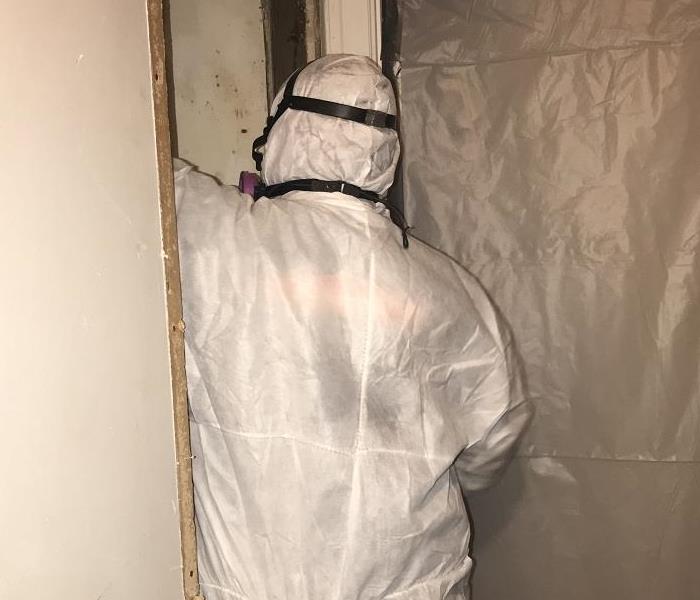PPE should be worn during cleanup of animal droppings
7/16/2018 (Permalink)
Histoplasmosis is an infection caused by breathing in spores of a fungus often found in bird and bat droppings. Histoplasmosis is most commonly transmitted when these spores become airborne, often during cleanup or demolition projects.
Soil contaminated by bird or bat droppings also can transmit histoplasmosis, so farmers and landscapers are at a higher risk of contracting the disease. In the United States, histoplasmosis commonly occurs in the Mississippi and Ohio river valleys, though it can occur in other areas, too.
Most people with histoplasmosis never develop symptoms and aren't aware they're infected. But for some people — primarily infants and those with compromised immune systems — histoplasmosis can be serious. Effective treatments are available for even the most severe forms of histoplasmosis.
Symptoms
Several types of histoplasmosis exist. The mildest form produces no signs or symptoms, but severe infections can be life-threatening. When signs and symptoms do occur, they usually appear three to 17 days after exposure and may include:
- Fever
- Chills
- Headache
- Muscle aches
- Dry cough
- Chest discomfort
In some people, histoplasmosis can also produce joint pain and a rash. People who have an underlying lung disease, such as emphysema, may develop a chronic form of histoplasmosis.
Signs of chronic histoplasmosis may include weight loss and a cough that brings up blood. The symptoms of chronic histoplasmosis sometimes can mimic those of tuberculosis.
Severe histoplasmosis
The most severe variety of histoplasmosis occurs primarily in infants and in people with compromised immune systems. Called disseminated histoplasmosis, this variety can affect nearly any part of your body, including your mouth, liver, central nervous system, skin and adrenal glands. If untreated, disseminated histoplasmosis is usually fatal.
When to see a doctor
Contact your doctor if you develop flu-like symptoms after being exposed to bird or bat droppings — especially if you have a weakened immune system.
Request an Appointment at Mayo ClinicCauses
Histoplasmosis is caused by the reproductive cells (spores) of the fungus Histoplasma capsulatum. The spores are extremely light and float into the air when dirt or other contaminated material is disturbed.
Even if you've had histoplasmosis in the past, you can still get the infection again. However, if you contract histoplasmosis again, the illness will likely be milder than the initial infection.
The histoplasmosis fungus thrives in damp soil that's rich in organic material, especially the droppings from birds and bats. For that reason, it's particularly common in chicken and pigeon coops, old barns, caves and parks. Histoplasmosis isn't contagious, so it can't be spread from person to person.
Risk factors
The chances of developing histoplasmosis symptoms increase with the number of spores you inhale. Professions with a higher likelihood of spore exposure include:
- Farmers
- Pest control workers
- Poultry keepers
- Construction workers
- Roofers
- Landscapers and gardeners
- Cave explorers
Most at risk of severe infection
Children younger than age 2 and adults age 55 and older have weaker immune systems, so they're more likely to develop disseminated histoplasmosis — the most serious form of the disease. Other factors that can weaken your immune system include:
- HIV or AIDS
- Intensive cancer chemotherapy
- Corticosteroid drugs, such as prednisone
- Tumor necrosis factor inhibitors, often used to control rheumatoid arthritis
- Medications that prevent rejection of organ transplants
Complications
Histoplasmosis can cause a number of serious complications, even in otherwise healthy people. For infants, older adults and people with compromised immune systems, the potential problems are often life-threatening. Complications can include:
- Acute respiratory distress syndrome (ARDS). Histoplasmosis can damage lungs to the point that the air sacs begin filling with fluid. This prevents efficient air exchange and can deplete oxygen levels in the blood.
- Heart problems. Inflammation of the pericardium, the sac that surrounds your heart, is called pericarditis. When the fluid in this sac increases, it can interfere with the heart's ability to pump blood efficiently.
- Adrenal insufficiency. Histoplasmosis can harm your adrenal glands, which produce hormones that give instructions to virtually every organ and tissue in your body.
- Meningitis. In some cases, histoplasmosis can cause meningitis, an infection and inflammation of the membranes surrounding your brain and spinal cord.
Prevention
It's difficult to prevent exposure to the fungus that causes histoplasmosis, especially in areas where the disease is widespread. Even so, these steps may help reduce the risk of infection:
- Avoid exposure. Avoid projects and activities that might expose you to the fungus, such as cave exploring and raising birds, such as pigeons or chickens.
- Spray contaminated surfaces. Before you dig soil or work in an area that could harbor the fungus that causes histoplasmosis, spray it thoroughly with water. This can help prevent spores from being released into the air. Spraying chicken coops and barns before cleaning them also can reduce your risk.
- Use an effective face mask. Wear a respirator mask. Consult the National Institute for Occupational Safety and Health to determine which type of mask will provide adequate protection for your level of exposure.






 24/7 Emergency Service
24/7 Emergency Service
